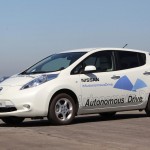Renault-Nissan Alliance has announced no less than 10 vehicles with autonomous drive technology will be launched in the next four years to 2020. The vehicles will be launched worldwide, in the United States, Europe, Japan and China. The technology will be installed on mainstream, mass-market cars at what the Alliance states will be, “affordable prices”.
In addition, Renault-Nissan will launch a suite of new connectivity applications that will make it easier for people to stay connected to work, entertainment and social networks in their cars. The goal is to achieve the much lauded “zero emissions, zero fatalities”, a clear indication electric cars will be the platform of choice for autonomous tech.
Zero emission and zero fatalities
Driver error is said to account for 90% of all fatal accidents on the road but major improvements have been made in safety and the efficiency of vehicles in recent years. In Japan, for example, Nissan vehicles saw a decrease of fatal and serious injuries by a massive 61% over 20 years and in France, Renault saw a decrease of 80% in 15 years. Autonomous drive is expected to help reduce driver error and therefore diminish these figures further still.
2016 will mark the debut of vehicles with “single-lane control,” a feature that allows cars to drive autonomously on highways, including in heavy, stop-and-go traffic. In 2018, Renault-Nissan will launch vehicles with “multiple-lane control,” which can autonomously negotiate hazards and change lanes during highway driving. And 2020 will see the launch of “intersection autonomy,” which can navigate city intersections and heavy urban traffic without driver intervention.
The above paragraph from the press release clearly details Renault-Nissan’s plan and we have already seen some of it come to the fore. The Infiniti (Nissan’s luxury brand) Q50 AWD hybrid features a range of driving aids that mean it comes close to providing autonomous driving on the motorway. In 2016, this will be vastly upgraded and made available on other Renault-Nissan Alliance cars. Furthermore, the Alliance plans to improve car and driver connectivity with the following:
Later this year the Alliance will launch a new automotive app for mobile devices, which allows remote interaction with your car. Next year, it will launch the first “Alliance Multimedia System,” providing new multimedia and navigation features, as well as improved smartphone integration and wireless map updates. In 2018, the Alliance Connectivity & Internet of Things platform will support the new Virtual Personal Assistant feature for individual and business customers.
Critically, each of the autonomous drive technologies will be available at the driver’s discretion.
To achieve these aims Renault-Nissan will invest its considerable $5 billion R&D budget into the technology and combine the engineering expertise of both Renault and Nissan together, so there there is no duplication of work. The engineers together will create a toolkit of driving aids that all Renault-Nissan Alliance brands can use, thereby making the entire exercise far more affordable to implement across the board and with a greater level of efficiency and reliability.
Renault-Nissan has research centres in Atsugi, Japan; Guyancourt, France; Farmington Hills, Mich.; and Sunnyvale, Calif. Renault-Nissan also has large engineering centres in India, Brazil, Romania, Turkey and China, among others.
Source; Renault-Nissan


